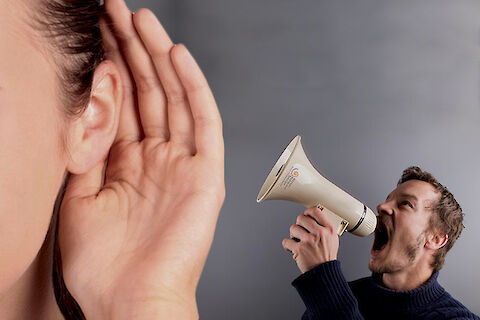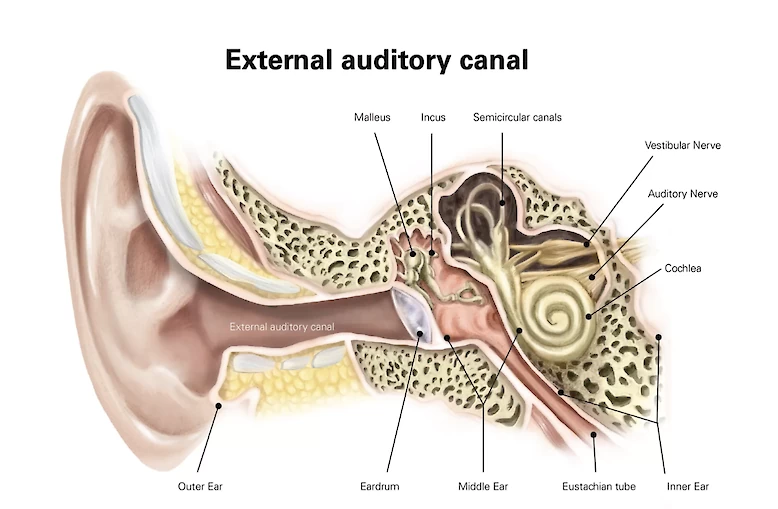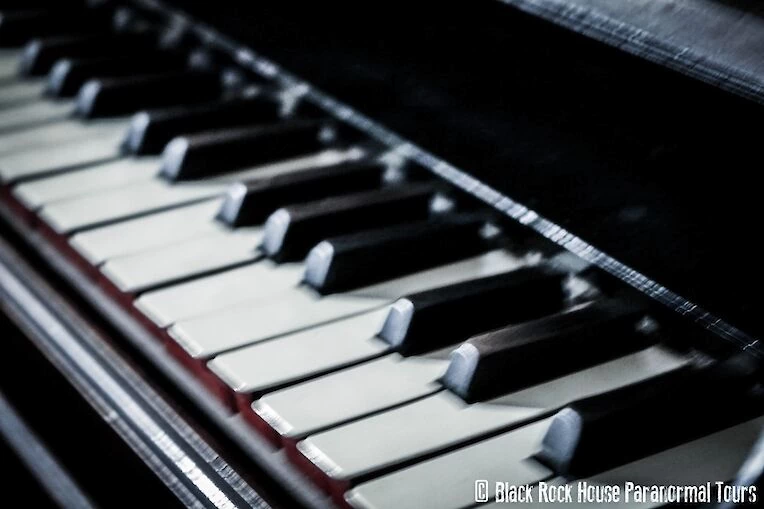

Autophony and the breathing ghost
Have you ever been in a situation where no one else is around you and suddenly you can hear breathing like someone is standing next to you? When you turn, there is no one there, but you can still hear the breathing. While it would be easy to think maybe there is a ghost standing next to you, it could also be a case of what is known as Autophony.
Autophony
Autophony is described as being able to hear one's own breathing or the sound of their voice is quite loud and booming, more so than it would be normally. You may even be able to hear things like your own heartbeat and bodily functions as if they are happening inside your head. In some people, their condition is so severe that they cannot hear anything but their own voice. Autophony is caused by a Patulous Eustachian Tube.
The symptoms of ear pressure, hearing yourself breathe, and hearing a distortion in your own voice as if you are talking through a kazoo are typically caused by failure of the eustachian tube to close. The symptom of hearing yourself breathe is called “autophony. Normally the eustachian tube remains closed except when we yawn or swallow, at which time it briefly opens to equalize the air pressure in the middle ear. A eustachian tube that is excessively open is called “patulous.” Frequently, the eardrum will pop inward and outward with each breath, like the plastic windows wrapped around a screened porch in the wintertime. The patient will also hear himself breathe in as if listening to a stethoscope placed over the throat. Finally, the patient will often complain of a buzzing distortion of his or her own voice, as the sound of speech travels up the eustachian tube faster than it reaches the outer ear through the room. The condition is most common in patients who are particularly slender or athletic, and often occurs during aerobic exercise. The symptom is usually relieved by lowering the head, which increases venous congestion in the head. Some patients will feel an incessant need to sniff the eardrums inward, which can stretch the eardrums and make them more floppy.
https://www.richmondent.com/blog/ask-the-doctor-what-is-a-patulous-eustachian-tube/

Alan Gesek / Stocktrek Images / Getty Images
When you have a Patulous Eustachian Tube, you may also notice tinnitus or feel like your ear is blocked. I know I have been in situations where I can hear my own breathing at a heightened level. If you are on a paranormal investigation and suddenly you find you are hearing breathing, it would be easy to think a spirit is nearby. Even if you are at home alone, it would be quite unsettling. If it presents itself as a form of hearing loss that comes on suddenly, people may think that a spirit is affecting them. It is important in these kind of situations to, first of all, remain calm. If you are by yourself and you hear the breathing, stop and slow down and focus on your own breathing. You will soon be able to tell if it is your own. If you are not alone, is anyone else hearing the breathing? If it is only you hearing a sound, it is possible you are suffering from a form of auditory hallucination.
Auditory Hallucinations
Problems with our hearing often end up presenting themselves as auditory hallucinations. It is important to understand that even though the word hallucination is used, it is not a psychiatric disorder. It is caused mainly by forms of hearing loss. When the brain hears a phantom sound, it tries to make sense of it - much in the same way as pareidolia works. The word pareidolia is defined as a psychological phenomenon involving a stimulus (an image or a sound) where our mind interprets a familiar pattern of something where it doesn’t really exist. If you understand the visual version, basically it is exactly the same, but with sound. Our brain is constantly looking for patterns so it can make sense of what is happening. If there is a break or disruption to this pattern, our brain is forced to fill in the blanks. This is why we will see faces in clouds. It also means we can often hear things that are not really there. A dripping tap for example can confuse our brain and make us think we are hearing a voice. While the conditions we are looking at below are more exclusive to a person only hearing something, an auditory hallucination can be heard by a whole group of people. so just because it is something that is heard by more than one person, doesn't make it paranormal. If you hear a noise, investigate where it could be coming from. Sound can travel far, especially in old buildings. Look for dripping taps, open windows, outside noise, humming fans, or anything that can potentially make you think you are hearing something else. Sometimes the explanation is right in front of you.

Photo by Kaboompics .com from Pexels
Tinnitus
Tinnitus is a really annoying condition. I know because I suffer from it. It is described as a ringing sound, yet others hear it as a buzzing, clicking, or something similar to crickets. Tinnitus is said to affect between 15-20% of the population. It is not a condition on its own, it is caused by an underlying condition such as hearing loss, ear injury, or a circulatory system disorder. One of the most common causes is exposure to loud noise over a period of time. For me, all those rock concerts where I loved being up the front next to the speakers weren't the greatest idea. Mine is quite mild and usually only bothers me at night time when I am trying to sleep and I can go days or weeks where I don't notice it. It is at night that it causes a person the most distress. When you don't have the distraction of everyday noise etc and you are in silence, it is more common to hear this ringing in your ear. Often on a paranormal investigation, a room will go silent as you sit and wait for something to happen. This is the perfect opportunity for tinnitus to kick in. When it does. it is a sound that is being produced only for you. Much like the breathing you are hearing in a case of autophony if you were to do a recording, for example, it will not pick it up as it is essentially in your head. The difference is though that it is a very real sound that you are hearing and not something you are making up.
What I have noticed, is that when my ears are ringing quite loudly, I often hear voices. Sometimes it sounds like people are talking and no one is there. At night if I am lying in bed and my ears are ringing, I have heard my name. It only ever seems to happen when my ears are ringing. One thing I have heard many times and even experienced myself is that only one ear will start ringing quite randomly. Some people within the paranormal say that this means a change in frequency and that a spirit is nearby. I honestly don't know if there is truth to this, but as someone that suffers from tinnitus, when it happens to me, I have to write it off as tinnitus as I know it is something I suffer from and it comes and goes randomly every day. When you suffer from some form of hearing loss, your brain is not getting the stimulation it needs to process information. So again in the same way it searches for images when it comes to visual pareidolia, it searches internally to get these sounds and produces in my case that ringing noise.
Pressure changes in the ear
Sometimes the ringing in one ear that I mentioned above, can also present to people as a pop. You know that awful feeling when you are on an airplane and there is a change in the cabin pressure? Your ears feel blocked and suddenly there is a ‘pop’ feeling. This is due to the cabin pressure changing. This can happen to people in everyday circumstances – including when they are investigating the paranormal.
When this happens, the pressure change is thought by some to be a change of energy in the room or that something is trying to communicate with you. A lot of sensitive people use this as an indication that they are not alone. While this could be the case, it could also be Ear barotrauma. This is a condition that causes discomfort due to pressure changes that makes them feel more prominent. While some people may not notice pressure changes at all, to others it can end up being uncomfortable and even painful.
Another common thing that can happen to anyone is the eustachian tube which connects your middle ear to your throat and nose can become blocked. If you have a cold or suffer from hayfever or even prone to ear infections, it can cause this tube to become blocked. This will give you the same sensation as if you are on an airplane. Another side effect is that it can also cause you to feel unbalanced, feel like you are rocking on a boat, light-headed and faint. These are also symptoms that can be interpreted to be paranormal. How many times have you heard someone say they feel like they are rocking on a boat? I have even seen people swaying. When you think about it, a lot of these old places are old and there is a lot of dust. You are out in the cold - particularly during winter and it could easily cause this phenomenon.
Musical Ear Syndrome
Often on a paranormal investigation, someone will hear music. It is often like a classical style, like a piano for example but it can be anything. Given that a lot of the locations normally have a piano somewhere in the building, it is often assumed that it is a spirit's way of making itself known. Maybe they are playing the piano. It could all be a part of a residual playback at a location. I have been to many locations where there are reports of music playing. In fact during an investigation once, we all heard what sounded like music coming from another room. There was no one in there and we couldn't find the source.

Another explanation for this phenomenon is what is called Musical Ear Syndrome or MES for short. It is also interesting because like the other conditions above, it is a sound that a person is hearing, yet others are not hearing the sound. This is why in many cases a person may report hearing music in a location, yet it is not captured on a recording and no one else can hear it. To the person, it sounds like it is far away, almost like a neighbour is playing music or it is coming from another room. It is faint. It is not loud and overbearing in a person's head.
It is estimated that approximately 5% of the population suffer from this syndrome, however, a lot of people think they are crazy when they hear music and don't necessarily seek help so the number is thought to be higher. Again it is not a psychiatric condition. While there are some instances where it can be related to a person's mental health, it is most commonly presented in people that have suffered from some form of hearing loss.
Is it paranormal?
How does one differentiate Musical Ear Syndrome or any of the other conditions from something potentially paranormal? The first question to ask is if the sound is limited to just one person or if a whole group can hear it (also being aware of the power of suggestion is important too). I always recommend at least filming every investigation, not as a tool to potentially capture paranormal activity, but as a way to have an unbiased account of what is really happening. If you don't have a camera, again a digital recorder can document the night. You don't need to record specifically to look for EVP, it can be a great reference to understand things were happening on the night. Did the sound appear on the recording? If it was a very real sound, it should be captured on tape. If it is something that is limited to just one person, a form of auditory hallucination is a possible candidate here. If they are hearing a very loud distinct sound that doesn't sound like it is coming from far away, that is not typical of an auditory hallucination, there could be another explanation. While it may not be an auditory hallucination, it may not also be paranormal. It is important to look at a range of explanations.
One of the biggest things to consider when one of the above happens on an investigation is if the experience is limited to just one person. Are there other things happening at the same time that indicate something is happening or is a person relying on these feelings alone? If we are able to measure changes in the atmosphere it can potentially explain a pop at least, but what if the figures don't change? What if there is something happening here? It is one of those things where again as a paranormal investigator you need to be aware, but also open. If you experience one of the above phenomena, you have to consider that it may not be paranormal. Ask yourself if you have had a cold recently or any issues with your hearing? Has anyone else heard or experienced the same? When on an investigation it is important to speak up. People may feel embarrassed or too shy to say they are hearing something but it is important to verbalize what is happening. If someone else is experiencing the same thing, you can rule out hallucinations caused by forms of hearing loss and start looking for a source. The best thing you can do as well is to look at things in context and as an overall picture. It can be very easy to get caught up in a moment and make something out of nothing. Stay calm and put that investigator's hat on and try to explain what is happening. It is once you can't find a source or explanation that things really start to get interesting.
References
https://www.sciencedirect.com/topics/medicine-and-dentistry/autophony
https://www.richmondent.com/blog/ask-the-doctor-what-is-a-patulous-eustachian-tube/
https://www.verywellhealth.com/what-is-patulous-eustachian-tube-1191972
https://www.healthline.com/health/ear-barotrauma
https://www.health.harvard.edu/a_to_z/barotrauma-a-to-z
https://www.mayoclinic.org/diseases-conditions/tinnitus/symptoms-causes/syc-20350156
https://www.healthline.com/health/musical-ear-syndrome
If you enjoy LLIFS, consider buying me a book (otherwise known as buy me a coffee but I don't drink coffee and I LOVE books). Your donation helps to fund the LLIFS website so everyone can continue to access great paranormal content and resources for FREE!

Top pages with similar subjects
Don't forget to follow the Facebook page for regular updates
Join the mailing list to receive weekly updates of NEW articles. Never miss an article again!
Buy the latest and past issues Haunted Magazine
Check out the books written by LLIFS